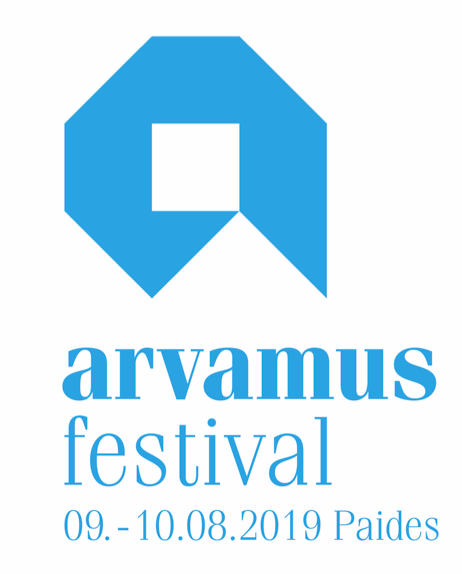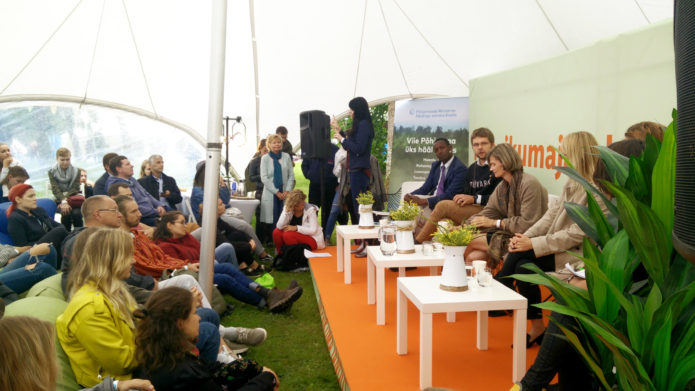‘Diversity – A Tool for Sustainable Success’ was a talk at the Opinion Festival/Arvamusfestival, organised by the Nordic Council of Ministers’ Office in Estonia, along with the Estonian Ministry of Economic Affairs and Communications, and the Estonian Roundtable for Development Cooperation. It looked at the concept and practice of diversity within and outside of Estonia, from the perspective of what moderator Annika Arras termed “the global village”.
The panel’s discussion was directed not only at identifying and offering potential solutions to any perceived problems in Estonia, but also at taking perspectives from people of different ages and backgrounds. Ahmed Abdirahman is a Swedish man of Somali ancestry, who spoke of how New York City was the first place he had visited outside of Sweden, and he could instantly feel as a young man that there was far greater diversity in New York.
While Abdirahman has made a success of his career in Sweden, having returned there to work, he felt there were systemic and unconscious biases that often prevented ethnic-minority applicants from getting jobs. However, as he relayed, the response, rather than stating the rejection was in any way due to race or background, was often for the recruiter to simply say, “thank you for the application.” He suggested that this was often down to bias against wanting to employ members of particular ethnic groups, and pointed this out as one of the key matters for governments to address under the banner of diversity.
Estonian politician Jevgeni Ossinovski of the Social Democrat party (SDE) was another member of the panel. He said, “diversity is a nice word to discuss, but it’s a different side of the same process to discrimination. Diversity gives you a warm feeling, and you don’t [feel as though you] have to talk about discrimination, which is nasty. It’s like how talking about prosperity is good because you [feel you] don’t have to talk about poverty. When you talk about diversity you shouldn’t forget to talk about discrimination. The fight for diversity, or against discrimination, fundamentally, is not about economic gain. It’s about fundamental freedoms, equality, ethics. Even if the economic gains are not there, we should still fight for diversity.”
Some believe that there are generators of inequality in Estonia in the system of applying for jobs. For example, in Estonia it is not required for companies in the private sector to list the recommended salary for vacancies. According to anecdotal evidence, there is a chance this leads to women nominating themselves for a lower salary than men when asked what they expect to earn in an interview. In answer to a question about this, Ossinovski, who prior to his most recent ministerial role as Minister for Health, had been the Minister for Gender Equality, said he had spoken up for this and other measures while in government.
“My ideas were presented to Cabinet, and I remember at the time there was one female minister. A colleague said, ‘what gender pay gap? I don’t see a gender pay gap.’ You get the picture as to why nothing is moving in that direction. It was a big fight, but I fought for half a year with the Ministry of Finance so they include in their Public Service Yearbook a section on gender equality. They measured different professions, age, whatever other characteristics, but they didn’t measure gender, because we ‘didn’t have a problem with gender.’ It’s a very, very conscious bias, they didn’t want to deal with the issue, but in the public sector now things are getting much better, partly because they know they’re going to be monitored.”
“When I tried to touch the private sector just a little bit, the backlash was incredible. In Estonia, when you open CV Keskus [the job-searching platform], you can filter out anybody. You can say, you’re looking for a Russian, young, girl. I wanted to say that you’d disallow these selections in the first round at least. Of course it turned out to be an ‘infringement on the entrepreneurship in this country’, and my fantastic coalition partners at Isamaa didn’t support it. If you think about it further, in terms of social value, the political situation has soured since then, which is why nothing has been done, and probably won’t be for a long time.”
Anu Realo, a professor in the Department of Psychology at the University of Warwick, listening to the discussions in the talk, cautioned against use of the term ‘unconscious bias’ to describe ingrained prejudice in individuals or society. “‘Unconscious bias’ has been a buzzword for a few years now. As a psychologist I’m not enthusiastic about [the word], if I may say – I think it’s one of the concepts where, when we talk about it, it allows us to justify discrimination in a way, and think we’re becoming better people by discussing and noticing it.”
“To be honest, research doesn’t really support it, because among individuals it’s not a stable characteristic. I may have biases this afternoon, but then you could test me tomorrow morning and I may not, or I may have different ones. I’m not saying there are not unconscious biases, but it’s not a stable characteristic, and we don’t have enough research to show it exists. It’s only important if it’s going to show something. We should know our biases, and address them, without calling them unconscious.”

